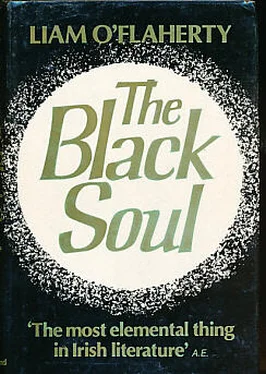The Stranger stood looking after him, clenching his fist, grateful to him for his sympathy and at the same time cursing him for having attempted to do him a favour. He heard a small boy coming up the road riding a donkey, and O’Daly stopped to talk to him.
‘Oh, boys, oh, boys, where did you get that elegant donkey?’
The Stranger turned sharply on his heel and walked back to the cabin. ‘Yeah, he forgot all about me immediately,’ he muttered angrily; ‘nobody cares a damn about me.’
Through the thick darkness stray lights flickered here and there about him in the windows of the cabins. They were little sickly red scars on the black face of the night. One would heave up towards him glimmering, as if the night swayed, and then retreat again. Or was it his mind that swayed, endeavouring to find an exit from the conflicting suggestions that urged him to do this and to do that? O’Daly’s words, ‘you are wasting your life,’ tumbled around in his brain, assuming strange formations as the words mixed, ‘are you wasting your life,’ ‘life wasting you are,’ in every conceivable way. He shrank from those words, and then pointing his finger at the sky he traced the words, ‘I will waste my life as I think fit.’ But that seemed to be childish. And his mind swayed again as suddenly something within said, ‘Why bother about your life? There is Little Mary in there. Forget the world.’ And he went into the cabin.
She was sitting by the fire rocking herself as he entered. She jumped up with an eager gleam in her eyes as she looked at him, but she immediately suppressed that look and stared coolly as she set a chair for him in front of the fire. Then she sat in the corner again, nervously arranging her shawl closely about her neck. He looked at her, feeling vexed with himself for having injured her, and with her for being the cause of his feeling vexed, for being a selfish fellow, like most men, he always took care to cast the blame for his meanness on other shoulders. His nerves began to strain at the silence and his lips twitched. One moment they twitched trying to hold back an onrush of apologies, at the very next moment trying to hold back an outburst of anger. In his anger he would say to himself, ‘What right has she to be jealous of Kathleen O’Daly? It was her own fault if I am under an obligation to her.’ Then when he looked at her sad beautiful face he grew tender. He would make a motion to reach out his hand to her and then draw back shuddering and put his hand over his mouth. At last he jumped to his feet and cried, ‘Oh, damn this business, it will drive me mad.’ He stood looking stupidly at the fire with his hands in his pockets. Unable to restrain herself any longer, she uttered a low cry, and jumping up threw her arms about his neck. But somehow her touch hardened him. He unbound her arms, and holding her by the shoulders looked into her eyes with set lips. She looked at him wearily. The sadness in her eyes pained his heart physically. He felt a desperate longing to kiss her and say sweet things to her. Yet something held him back, and he kept looking at her with hard eyes. Then Little Mary, her eyes staring with fright at his look, her bosom heaving with unborn sobs, rushed from his arms. She staggered to her stool and fell in a heap face downwards on it, bursting into tears. Then that something that held him back vanished with a snap and he fell on his knees beside her. He kissed her eyes, her lips, her ears, her forehead, her throat, her hands. He rubbed his hands through her hair, and pressing his cheek against hers, mumbled almost inaudibly, ‘I love you, I love you.’ Her sobs stopped suddenly, and she strained her ears excitedly, scarcely able to believe the words that she had hardly even dared to hope for. Slowly she raised her eyes to his face, and a low gurgling sound began to rise from her breast louder and louder, until it rushed from her lips almost with a scream, a sound that might be a scream of pain or of intense joy. Covering her eyes with her hands she nestled her head against his breast. With his chin resting on her head he knew that he loved her and he wondered fearfully what was going to be the outcome. Even love filled his Black Soul with fear.
And Little Mary, when he had gone to bed, sat by the fire kissing the places on her hands where his lips had rested.
2
At Rooruck spring does not die. Like a river seeking the ocean, it gathered strength and beauty each day from its staggering frozen birth until it passed majestically into the luxuriant bosom of summer. Rooruck changed hour by hour, minute by minute, with each rush of the wind, each westward leap of the sun, each thud of the sea against its cliffs. The hungry black earth grew green with dewy grass. Sharp-pointed buds edged their way timorously through the hard soil of the tilled fields. The wind and rain descended softly on the crags and fields, whispering to the life that was coming from the womb of the earth. The air was fragrant with a sense of joy. It was like hearing good news of a loved one. Lambs frisked in the fields among the crags above the village, their growing wool already hanging from their sides in zigzag ringlets. Calves were rushing about stupidly, their tails in the air. The people began to laugh and look about them happily, their crops sown. They had already eaten eggs in homage to Crom for all the lives that had been born to them, from their sheep and cattle, on the day that Christians call Easter Sunday. One could almost hear nature clashing cymbals, urging life to grow. Beautiful, hard, grey spring life at Rooruck that swelled the chest and put steel into the eye and a warlike song in the throat. Full-grown spring at Rooruck that robbed men of fear and weakness.
Little Mary was as happy as the lark that rose each morning to sing from her grassy nest in the clover field beneath the cabin, where those furry-headed young larks were hugging one another. Now everything was plain to her. She could see the expanse of the future rolling itself out before her, and always she and her lover walked hand in hand across it. Every other year at the end of spring she had set a goose to hatch. But that year she did not. She had already cut herself adrift. She was waiting eagerly for her lover to say ‘come,’ waiting to fly with him over the sea. When they embraced she would look in his eyes and say, ‘I wish we were together away from everybody.’ And he would say, ‘So do I, dearest,’ and then bite his lips, for he feared that final step that would make him hers.
Nature tugged at his heart, urging him to be a man and take her with him out into the world, but his intellect refused to move in response to nature. ‘How could I support her?’ it would say. And then, ‘What the hell do I want her for, anyway? I’m not going back into the world for anybody.’ And his fear of having to go back to the struggle of life kept him in torment, preventing him from loving her. Every time he embraced her, the thought was constantly in his mind that she was trying to use him for her own purposes, selfishly. He told himself repeatedly that life did not interest him, and yet he felt the urge to do something growing daily more intense. The satisfied happy look on the faces of the peasants who had sown their crops maddened him. He felt like a soldier who is straggling behind a victorious army, unable to reach the conquered capital with them because he has led a debauched life. He felt everybody despised him, and that made him long still more to pretend indifference.
Then Bartly the son of Black Peter got married to a woman from Coillnamhan. Horses galloped madly from Rooruck to the church at Coillnamhan. Then they galloped back again, the bridegroom leading, with the bride riding pillion. The whole village gathered in Bartly’s cabin and prepared to spend that day and the following night carousing, in celebration of the mating. Two men went around all the cabins in the village with a jar of whisky, forcing everybody to drink to the health of the newly wedded couple. Then everybody who had not been to the church drank a glass, saying, ‘May their seed prosper,’ and went to the wedding. Red John and Little Mary went. The Stranger, seeing Little Mary going to mix with the peasants, eager for the music and dancing, felt madly jealous and grew disgusted with her. It was as if he had seen a civilized savage woman eat human flesh in a moment of abandonment. At least he told himself that it was disgust, but he really felt vexed with her for being able to enjoy simple things from which he himself was cut off by his Black Soul and his foolish belief in his own importance. He waited alone in the cabin, listening to the distant sounds of merrymaking, and pretended that he was indifferent, but he could not feel indifferent. He kept wondering whether she was dancing with somebody else or whether she would smile into some other man’s eyes and allow them to squeeze her waist.
Читать дальше












